英语写作讲座
学术英语abstract写作专家讲座
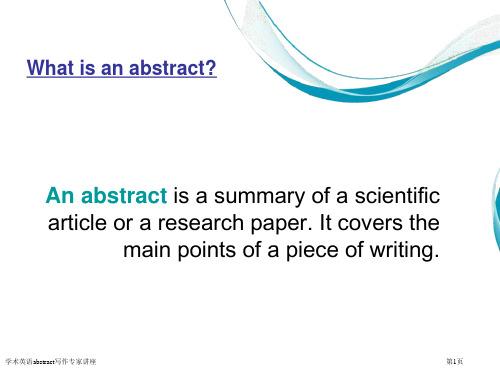
results
educators. Results also revealed a very positive students’ attitude towards
the instructional format. The learning effect concerning assessment was
stated in the paper.
References to the literature must not be
cited in the tract (except in rare
instances, such as modification of a
previously published method).
第1页
Note:
Most or all of the Abstract should be
written in the past tense, because it refers
to work done.
The Abstract should never give any
information or conclusion that is not
yet poisonous gasses and particles that remain in houses or cars, including
heavy metal and radioactive materials. And a survey was conducted on
attitudes towards smoking in 1,500 households across the United States. It
高三英语复习写作专题讲座:第11讲 应用文(一)——书信、电子邮件(新人教版)

高考复习 ┃ 高三英语写作专题讲座
The occasion will start at ________(具体时间). This will
be followed by a ________(进一步的安排).At around
________(时间),________(另一个安排).
高考复习 ┃ 高三英语写作专题讲座
高考复习 ┃ 高三英语写作专题讲座
高考复习 ┃ 高三英语写作专题讲座
高考复习 ┃ 高三英语写作专题讲座
[题目要求] 假定你是李华,你所喜爱的Global Mirror周报创刊五周 年之际征集读者意见。请你依据以下内容给主编写封信, 内容主要包括:
高考复习 ┃ 高三英语写作专题讲座
1.说明你是该报的忠实读者 2.赞赏该报优点: 1)兼顾国内外新闻 2)介绍名人成功故事 3.提出建议: 刊登指导英语学习的文章 注意: 1.词数100左右,开头语己为你写好;
高考复习 ┃ 高三英语写作专题讲座
Everyone agrees that it was you who ________(给出细
节).Again, I would like to express my warm thanks to
you! Please accept my gratitude.
Yours sincerely, Li Ming
Li Ming
高考复习 ┃ 高三英语写作专题讲座
高考复习 ┃ 高三英语写作专题讲座
第一步
构建框架,清晰行文
[谋篇布局]
高考复习 ┃ 高三英语写作专题讲座
[黄金模板] Dear EditorinChief,
Congratulations on the 5th anniversary of Global Mirror! I'm ________________________(介绍自己). I like it very much for________________________(两个理由). First, it covers ________________________(优势之一) so that, by simply turning the pages, I can learn ________________(了 解的事情) during the week. ________________(优势之二) are the success stories of worldfamous people which help me ________________________(对自己的帮助).
学校要开展中国传统文化的讲座,英语应用文写作

学校要开展中国传统文化的讲座,英语应用文写作01假定你是李华,是某高中的一名学生。
为了让更多的人了解中国优秀的传统文化,你校近日将举办中国传统文化展(the traditional chinese culture fair)。
请给你的外教mr. smith写一封电子邮件,邀请他参加。
邮件的内容包括:(1)展览会时间和地点:本周五下午2:00--5:00,本校艺术中心;(2)展会宗旨:让更多的人了解中国优秀的传统文化;(3)展览内容:有关书籍、图片、实物等:注意:(1)词数左右;(2)可以适当增加细节,以使行文连贯。
【杰出满分范文】dear mr. smith,i'm writing to invite you to the traditional chinese cultural fair to be held by our school at the art center this friday afternoon, from 2pm to 5psince this event aims to help more people learn about the traditional chinese culture, the staff, all the students and their parents as well as anyone interested in it are welcome. at the fair, related books, pictures, videos and objects will be exhibited, through which visitors will not only understand traditional chinese culture better but also definitely feel the unique beauty of it.if you're interested, please come and enjoy it. and i'd be glad to offer any help. looking forward to youy early reply.yours,li hua02假设你就是李华。
高考英语写作专题复习备考讲座课件

确定好文章中心后,列好提纲,方可动笔写作,一气呵成。 写作时可根据题目的主题和要求套用适当的模板,把材料按照一 定的逻辑顺序组织起来,使用一些关联词使文章丰满,上下连贯 ,同时把各个句子和段落连接起来,使文章衔接自然,语言流畅 ,符合英语的表达习惯。对于与要求无关的内容切忌任意发挥, 画蛇添足。
3. 我看到了一些不良行为。
I found some bad behavior.
→ I found some bad behavior.I was quite disappointed to find some bad behavior. (心理 )
方法三 添加与所给信息有关的原因,结果,条 件,让步,手段,目的等内容
). 33.5% of the students feel happy that their parents trust them ,laying a basic foundation for family communication (3) (扩展 句). 31.7% are content to be in the equal position with their parents when they are talking with each other (4) (扩展句).
此外,三段之间要灵活运用“启、承、转、合”的过 渡手段。
利用十句作文法要注意:
(1) 选好开头句 (做到概括性强,表达清楚,主题突出) (2) 合理安排结构 (3) 恰当选择句型
下面是一篇典型的十句作文法的例子。
假如你校最近就“家长应该如何对待孩子”的问题进行了调 查,结果如下。请根据图表1中提供的信息描述调查结果,并针对 图表2中的一个数据所反映的情况表达你的看法。
外研社 公益讲座 学术英语写作进阶教程
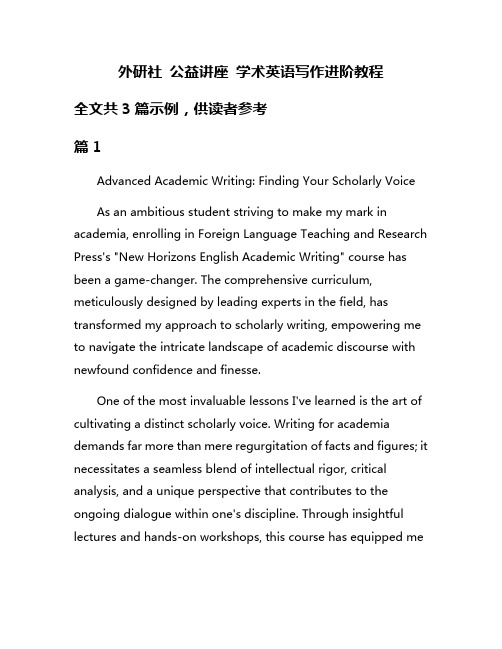
外研社公益讲座学术英语写作进阶教程全文共3篇示例,供读者参考篇1Advanced Academic Writing: Finding Your Scholarly VoiceAs an ambitious student striving to make my mark in academia, enrolling in Foreign Language Teaching and Research Press's "New Horizons English Academic Writing" course has been a game-changer. The comprehensive curriculum, meticulously designed by leading experts in the field, has transformed my approach to scholarly writing, empowering me to navigate the intricate landscape of academic discourse with newfound confidence and finesse.One of the most invaluable lessons I've learned is the art of cultivating a distinct scholarly voice. Writing for academia demands far more than mere regurgitation of facts and figures; it necessitates a seamless blend of intellectual rigor, critical analysis, and a unique perspective that contributes to the ongoing dialogue within one's discipline. Through insightful lectures and hands-on workshops, this course has equipped mewith the tools to develop a authorial identity that resonates with my academic peers.Mastering the nuances of academic style has been a pivotal aspect of my journey. Contrary to the conventions of casual writing, scholarly prose demands a heightened level of precision, objectivity, and adherence to established norms. The course has meticulously dissected the intricacies of academic writing, from the strategic use of passive voice and hedging language to the intricate art of citation and referencing. By internalizing these principles, I've learned to navigate the delicate balance between assertiveness and humility, projecting authority while acknowledging the contributions of fellow scholars.Perhaps the most transformative aspect of this course has been its emphasis on critical thinking and argumentation. Academic writing, at its core, is a quest for knowledge, a relentless pursuit of truth through intellectual discourse. The instructors have challenged me to question assumptions, scrutinize existing literature, and formulate well-reasoned arguments that contribute to the advancement of knowledge within my field. Through rigorous exercises in literature review, synthesis, and analysis, I've honed the ability to identify gaps, contradictions, and opportunities for novel insights.Equally invaluable has been the guidance on structuring and organizing complex academic works. From crafting compelling introductions that capture the reader's attention to constructing logically coherent body paragraphs and drawing insightful conclusions, this course has demystified the intricate architecture of scholarly writing. I've learned to weave together multiple strands of thought, seamlessly transitioning between ideas while maintaining a consistent narrative thread that leads the reader through a captivating intellectual journey.Moreover, the course has equipped me with invaluable strategies for conducting effective research and marshaling evidence to support my claims. I've explored the intricacies of database navigation, keyword optimization, and the evaluation of sources – skills that are indispensable in an age where information proliferates at an unprecedented rate. By mastering these techniques, I've learned to navigate the vast expanse of academic literature with precision, identifying relevant and authoritative sources that lend credibility to my arguments.Perhaps most significantly, this course has instilled in me a profound appreciation for the collaborative nature of academic endeavors. Writing for academia is not a solitary pursuit; it is a dialogue, a symphony of voices contributing to theever-evolving tapestry of human knowledge. Through peer review exercises and group discussions, I've learned to embrace constructive criticism, to view feedback as an opportunity for growth, and to engage in respectful discourse with fellow scholars.As I approach the culmination of this transformative journey, I find myself equipped with a potent arsenal of skills, a sharpened intellect, and a profound respect for the academic tradition. The "New Horizons English Academic Writing" course has been an invaluable investment, one that has prepared me to navigate the rigors of scholarly writing with confidence and distinction.Yet, my journey is far from over. Academia is a relentless pursuit, a constant evolution of thought and expression. As I embark upon my academic career, I carry with me the invaluable lessons gleaned from this course, a foundation upon which I will continue to build, refine, and contribute to the ever-expanding frontiers of knowledge.篇2Academic English Writing Advanced Course by Foreign Research Press - A Student's PerspectiveAs an eager learner constantly striving to elevate my academic English writing abilities, I jumped at the opportunity to enroll in the "Academic English Writing Advanced Course" offered by Foreign Research Press. This intensive program promised a comprehensive exploration of intricate writing techniques, seamlessly blending theoretical frameworks with practical applications. Little did I know that this course would not only refine my writing prowess but also profoundly shape my perspective on the art of academic discourse.The first few sessions laid the foundation, dissecting the intricate structure of academic papers. We delved into the nuances of crafting a compelling introduction that captivates readers and articulates the research's significance. The instructors meticulously guided us through the process of formulating a clear thesis statement, ensuring our arguments were well-defined and focused. This meticulous attention to detail set the tone for the entire course, instilling in us the importance of precision and coherence in academic writing.As we progressed, the course ventured into the realm of literature review, a crucial component of any scholarly work. We learned to synthesize diverse sources, evaluating their credibility and relevance to our research objectives. The instructorsemphasized the art of critical analysis, teaching us to scrutinize existing literature with a discerning eye and identify gaps or opportunities for further exploration. This exercise not only honed our analytical skills but also fostered a deeper appreciation for the iterative nature of academic inquiry.One of the most invaluable lessons I gained from this course was the art of effective argumentation. We explored various rhetorical strategies, learning to construct persuasive arguments that seamlessly integrated evidence from reputable sources. The instructors encouraged us to challenge prevailing notions, to think critically, and to articulate our perspectives with clarity and conviction. This skill proved invaluable not only in academic writing but also in cultivating a mindset that values intellectual discourse and open-mindedness.As the course progressed, we ventured into the intricacies of data analysis and presentation. We learned to interpret both qualitative and quantitative data, extracting meaningful insights and communicating them effectively through appropriate visual aids. The instructors emphasized the importance of transparency and ethical data handling, instilling in us a sense of responsibility as scholars contributing to the broader academic community.Throughout the course, we engaged in peer review sessions, where we provided constructive feedback on each other's work. These sessions fostered a collaborative learning environment, encouraging us to view writing as an iterative process and to embrace feedback as an opportunity for growth. The instructors skillfully facilitated these discussions, offering guidance and insights that enriched our understanding of academic writing conventions.However, the true transformative power of this course extended far beyond the realm of writing techniques. It instilled in us a profound appreciation for the pursuit of knowledge and the responsible dissemination of research findings. We explored ethical considerations, plagiarism prevention, and the importance of maintaining academic integrity. These lessons transcended the boundaries of the classroom, shaping our character as scholars and instilling in us a deep respect for the principles that govern the academic community.As the course drew to a close, we were tasked with producing a comprehensive research paper, synthesizing the lessons learned throughout the program. This capstone project challenged us to apply the strategies and techniques we had acquired, pushing us to new heights of academic excellence. Thesense of achievement upon successful completion was unparalleled, as we had not only mastered the art of academic writing but also developed a profound understanding of the scholarly discourse that drives intellectual progress.Reflecting on this transformative journey, I cannot help but feel a profound sense of gratitude towards Foreign Research Press and the dedicated instructors who guided us through this rigorous program. Their unwavering commitment to academic excellence and their passion for fostering intellectual curiosity were truly inspiring. This course was not merely an academic endeavor; it was a transformative experience that shaped our identities as scholars and ignited within us a lifelong pursuit of knowledge and intellectual growth.As I embark on my academic and professional journey, I carry with me the invaluable lessons from this course, armed with the tools and mindset necessary to navigate the complexities of academic discourse. The skills I acquired will undoubtedly serve as a solid foundation, enabling me to contribute meaningfully to the ever-evolving body of knowledge within my chosen field. More importantly, this course has instilled in me a deep reverence for the pursuit of knowledge and a commitment to upholding the highest standards of academic integrity.To fellow students and aspiring scholars, I wholeheartedly recommend this course as an invaluable investment in your intellectual growth. Embrace the challenges it presents, for they will ultimately shape you into a confident and articulate academic writer, capable of engaging in meaningful discourse and contributing to the advancement of knowledge. The journey may be arduous, but the rewards are immeasurable, transcending mere academic achievements and extending to the realm of personal growth and intellectual enrichment.篇3Academic English Writing Advanced Course by FLTRP: A Student's PerspectiveAs an English major diligently striving to enhance my academic writing prowess, I recently had the privilege of attending the "Academic English Writing Advanced Course" organized by Foreign Language Teaching and Research Press (FLTRP). This intensive program promised to equip us with the skills necessary to navigate the intricate world of scholarly writing, and I must admit, my expectations were high.From the outset, the course was a whirlwind of information and practical exercises, meticulously curated to challenge ourexisting knowledge and push us beyond our comfort zones. The instructors, all renowned experts in their respective fields, brought a wealth of experience and a contagious passion for academic writing that immediately captivated the entire class.One of the course's standout features was its comprehensive coverage of various writing genres prevalent in academic circles. We delved into the intricacies of research papers, dissertations, conference abstracts, and even book reviews. Each genre was dissected with surgical precision, exposing the underlying structures, stylistic nuances, and rhetorical strategies that successful scholars employ to convey their ideas effectively.Particularly enlightening were the sessions dedicated to the art of constructing a compelling argument. We learned the importance of identifying and articulating a clear thesis statement, marshaling evidence from credible sources, and employing logical reasoning to support our claims. The instructors emphasized the need for critical thinking and the ability to anticipate and address counterarguments, skills that are invaluable not only in academic writing but also in everyday discourse.Another aspect that resonated deeply with me was the emphasis on ethical academic conduct. Plagiarism, a scourgethat plagues the world of academia, was addressed head-on. We were taught the intricacies of proper citation methods, the nuances of paraphrasing, and the grave consequences of intellectual dishonesty. This module instilled in us a profound respect for the intellectual property of others and a commitment to upholding the highest standards of academic integrity.Hands-on exercises and peer review sessions were woven throughout the course, allowing us to apply the acquired knowledge immediately and receive constructive feedback from both our instructors and classmates. These collaborative experiences not only honed our writing skills but also fostered a supportive and intellectually stimulating environment where we could learn from one another's strengths and weaknesses.One particularly memorable exercise was the mock peer review session, where we assumed the roles of journal editors and reviewers. This simulation provided us with invaluable insights into the publication process, teaching us to critically evaluate scholarly works and provide constructive feedback that could elevate the quality of the research. It was a humbling experience that reinforced the notion that academic writing is a continuous journey of refinement and improvement.Amidst the wealth of knowledge imparted, the course also addressed the often-overlooked but crucial aspect of time management and productivity. We learned strategies for setting realistic goals, prioritizing tasks, and maximizing our efficiency throughout the writing process. These practical tips will undoubtedly prove invaluable as we navigate the demanding world of academia, where deadlines and competing priorities are ever-present challenges.As the course drew to a close, I found myself not only equipped with a robust set of writing tools but also imbued with a newfound appreciation for the art of academic communication. The instructors' passion and dedication were truly contagious, igniting within us a desire to contribute to the ever-expanding body of knowledge through well-crafted, articulate, and impactful scholarly works.In retrospect, the "Academic English Writing Advanced Course" by FLTRP was a transformative experience that transcended mere skill acquisition. It instilled in us a deep respect for the scholarly tradition, a commitment to intellectual honesty, and a burning desire to push the boundaries of human knowledge through our writing. Armed with the tools and mindset cultivated during this course, I feel empowered toembark on a lifelong journey of academic exploration, one well-crafted sentence at a time.。
雅思写作讲座(新航道)lesson 1
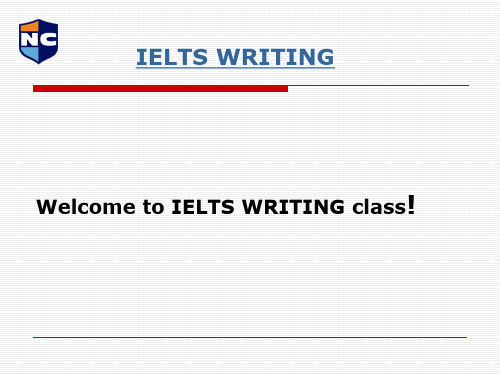
Requirements
1. 认真阅读历年真题 2. 对应相应不太会写的内容做提纲训练 3. 写作文后自己修改 (语法,词汇)-先质后量 4. 教师批改后自己再次修改 5. 在复习时候,应该针对话题然后按照题型训 练
WRITING
雅思写作的训练方法
(1)精读 (2)互译 (3)改写
何为模板?
有用网站
一. TR(Task Response任务反应情况) 二. CC(Coherence& Cohension连贯和衔接)
三. LR(Lexical Resources词汇资源)
四. GR&A(Grammatical Range& Accuracy语法 范围和精确度)
WRITING
英文写作的特点:(第一条评分标准)
IELTS WRITING:TASK II
低于Band 5的六种技术情况:
1. 2. 3. 4. 5. 没有完成写作任务 格式错误 字迹模糊,难以辨认 Task 1和Task 2写反 攻击考官
1. 2. 3. 4. 5. 6. 7. 8.
不能缩写 不能格式混乱 不能使用口语化词语 不能英式英语美式英语混用 while 的用法 字迹模糊,难以辨认 Task 1和Task 2写反 题型判断错误
IELTS WRITING:TASK II
三. LR(Lexical Resources词汇资源) 正式,准确,多样 四.
GR&A(Grammatical Range& Accuracy语法 范围和精确度) 准确,多样,时态,简单句+复杂句
四大问题
语 法
注意!!!
词汇 搭配
组织 逻辑 写作技巧
中式思维 中式语序 中式表达方式
2024届高三英语写作专项读后续写研讨讲座课件
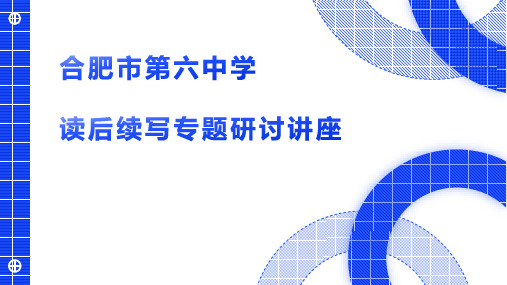
Step 2 Read and think
i
i
2 0 2 2 年 新 高 考 全 国Ⅰ 卷 英 语 ·读后 续 写
执教老师:长沙市弘益高级中学 瞿献锋
01
Warm up: Pick and try
Step 1 Warm up: Pick and try
12 3
Read it aloud:
Upon hearing the sad news, my heart sank.
Q2:DWavhida,twwhatscDouanvtisdm’osstriesstpootrnystehetobemstyofwyoourdr asb?ility in whatever
Hyoeua’rinrge dthoeinseg.words, he turned his head, tears shining in his eyes, and murmured(say sth. in a soft quiet voice) “but other kids will laugh at me. Maybe what the coach said is right” [with glum (quiet
Task4: Develop the plots
Para.1 We sat down next to each other, but David wouldn’t Qlo1o:kWathmated. id I decide to do? And how?
高考英语写作学校组织太空技术讲座的英语作文+讲义
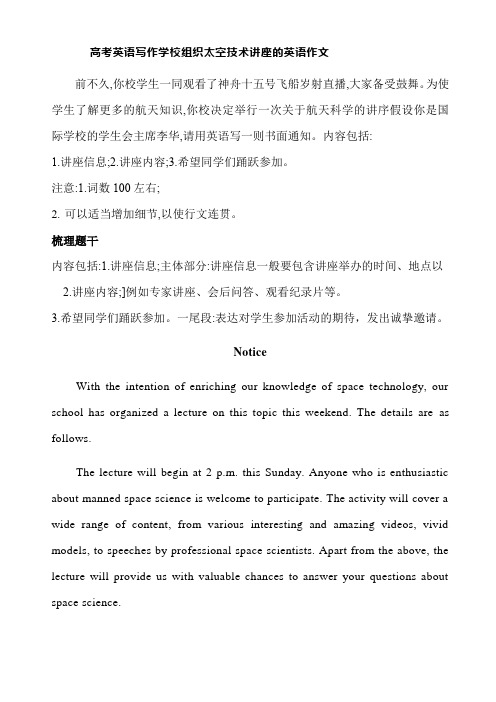
高考英语写作学校组织太空技术讲座的英语作文前不久,你校学生一同观看了神舟十五号飞船岁射直播,大家备受鼓舞。
为使学生了解更多的航天知识,你校决定举行一次关于航天科学的讲序假设你是国际学校的学生会主席李华,请用英语写一则书面通知。
内容包括:1.讲座信息;2.讲座内容;3.希望同学们踊跃参加。
注意:1.词数100左右;2.可以适当增加细节,以使行文连贯。
梳理题干内容包括:1.讲座信息;主体部分:讲座信息一般要包含讲座举办的时间、地点以2.讲座内容;]例如专家讲座、会后问答、观看纪录片等。
3.希望同学们踊跃参加。
一尾段:表达对学生参加活动的期待,发出诚挚邀请。
NoticeWith the intention of enriching our knowledge of space technology, our school has organized a lecture on this topic this weekend. The details are as follows.The lecture will begin at 2 p.m. this Sunday. Anyone who is enthusiastic about manned space science is welcome to participate. The activity will cover a wide range of content, from various interesting and amazing videos, vivid models, to speeches by professional space scientists. Apart from the above, the lecture will provide us with valuable chances to answer your questions about space science.We hope everyone can participate in this meaningful activity. Your participation will definitely make the event a huge success.范文二:进一步优化润色成拔高款作文,蓝色是好词好句好素材,尖子生可以选用NoticeEager to expand our understanding of space technology, our school has arranged for a fascinating lecture this weekend. Here's what you need to know:The lecture will begin at 2 p.m. this Sunday. If you're passionate about manned space exploration, you're cordially invited. Expect a diverse program, including captivating videos, lively models, and insightful talks from leading space scientists. Moreover, the event offers a prime opportunity to have your space-related inquiries addressed.We sincerely hope everyone will seize this chance to engage in this enlightening gathering. Your attendance would undoubtedly elevate the occasion.通知为了加深我们对太空技术的了解,我们学校将在本周末举办一场引人入胜的讲座。
- 1、下载文档前请自行甄别文档内容的完整性,平台不提供额外的编辑、内容补充、找答案等附加服务。
- 2、"仅部分预览"的文档,不可在线预览部分如存在完整性等问题,可反馈申请退款(可完整预览的文档不适用该条件!)。
- 3、如文档侵犯您的权益,请联系客服反馈,我们会尽快为您处理(人工客服工作时间:9:00-18:30)。
英语四级考试写作能就一定的话题或提纲在半小时内写出12-180词的短文写作的评分依据是:切题、条理、语言和字数。
所谓切题就是看你写的作文是否跑题。
所谓条理是指每一段的议论的正反清楚,说明的几个方面清楚。
一、审题我们拿到作文后第一件事要做的就是审题。
审题的作用在于使你的写作不跑题(如果跑题,条理和语言再好,也得不到及格分,甚至0分。
)那么审题要审什么呢?1.体裁(议论文、说明文、描述文)审题就是要审作文的体裁和题材。
因为什么样的体裁就会用什么样的题材去写。
那么体裁包括哪些呢?就四、六级考试而言,它包括议论文、说明文和描述文。
从近些年来看,四、六级作文不是单一的体裁,而是几种体裁的杂合体。
例如有一次四级写作题是这样出的:Directions: For this part, you are allowed 30 minutes to write a composition on the topic Trying to Be A Good University Student. You should write at least 120 words and you should base your composition on the outline (given in Chinese) below:1)It is very necessary to be a good university student.2)Several aspects of necessities to be a good university student做合格大学生的必备条件(可以德智体等方面谈)3)What I shall do in the future很多人说这种类型的作文是议论文。
说它是议论文是片面的。
因为第一段要求写“...必要性”,这说明本段体裁是议论文;第二段要求写“...必备条件”,这说明本段要求写说明文;而第三段要求写“...这样做”,说明本段要求写的是描述文。
所以说在大多数情况下,四、六级作文是三种体裁的杂合体。
2.根据不同体裁确定写作方法审题的目的就在于根据不同的体裁来确定不同的写作方法。
通过审题,可以看出四级作文大都是三段式。
如上例第一段为议论体、第二段为说明体、第三段为描述体。
议论体有议论体的写作方式、说明体有说明体的写作方式、描述体也有它自身的写作特点。
第一段为议论文:它的写作特点是要有论点和论据,而且往往从正反两面来论述。
例如上面题目的第一段的写作思路是:做合格大学生,会怎么样(这是从正面论述);不能做倒合格大学生,会怎么样(从反面论述);所以要做合格的大学生(结论)。
第二段为说明文:它的写作特点是从几方面或几条来说明一个问题,就跟某一机器的说明书一样通过1、2、3说明它的用途。
就以上面的作文而言,从三个方面(德智体)来说明做合格大学生的必要性。
第三段为描述文:以“人”为中心描述一个“做”的过程。
跟上两段相比,本段的主语多为人称代词。
它要与第二段相呼应进行描述。
二、主题句通过审题,我们知道了写作的思路。
下边就谈怎么样写。
第一步就是要写主题句。
主题句是确保不跑题的前提。
例如上述作文的三段主题句分别为:☆ It is very necessary to be a good university student.(议论段主题句)☆ There are several aspects of necessities to be a good university student.(说明段的主题句)☆ What I shall do in the future.(描述段的主题句)如果提纲句是英语就可以把它扩充成主题句,例如这样的一篇作文:Good Health(1)Importance of good health (2)Ways to keep fit (3)My own practice这样的作文的提纲句就可以扩展成主题句。
扩展后三段的主题句分别为:☆It is very important to have good health. (将名词importance变成形容词important)There are four ways to keep fit for me.(用there be句型)My own practices are as follows.(采用原词)三、条理保证不跑题是写作当中第一重要任务,第二个重要任务就是条理清楚。
对于议论文来说,正反面要清楚。
对于说明文来说,1、2、3条要清楚,对于描述文要来,谁干什么要清楚。
就拿上例Good Health来说,第一段保持正反面要清楚就应这样写:主题句(It is very important to have good health.,正面(With good health, we can...),反面(Without good health, we can do nothing. We can't do...)第二段应当这样写:主题句(There are four ways to keep fit.)从几方面说明:Firstly, we should have our breakfast in the morning. Second, we should have a nap at noon. Third, sports exercises are necessary in the afternoon. And fourth, we could have a pleasant feeling in the evening by listening to the music....)为了使文章更具条理性,我们可以用first(ly), second(ly) ,third(ly) 等副词,他们可以使文章的条理性十分突出。
作文是主观性题,要想得高分我们必须把评卷老师考虑进去。
评卷老师的时间很短(每份卷子的作文只有几分钟就要阅完)第三段应当这样写:主题句(My own practices are ….)具体情况(主语为第一人称代词I,与第二段呼应)In the morning, I have my breakfast . At noon, I have a nap. And in the afternoon, I always play football. In the evening, I usually listen to the classical music.综上所述,如果我们按以上几节的方法去做,就可以保证得到满意的分数。
大学英语考试作文评分原则来取总体评分Global Scoring,就文章的总体印象给分及奖励分Reward Scores,而不是按语言点的错误数目扣分。
如14分作文的标准是:切题,表达思想清楚,文字通顺,连贯性较好,基本上无语言错误。
总之,勤学多练,熟能生巧。
在阅读范文前可根据所给作文题目及要求按自己的思路试写一下,然后与范文对照找出差距,并有意识地背诵一些涉及科技、社会、文化等各个侧面的代表性文章,储存多种信息,以防写作时无话可说。
平时在阅读英语文章、报纸以及做模拟题时,要注意积累常用词汇、表达法及句型,分析文章的构思、组织方法,以便在写作考试时能做到有条不紊,顺理成章。
熟悉各种应试技巧:如何识别提纲中的关键词;如何将提纲转化为各段的主题句;临场注意事项放松情绪,必要时可借助深呼吸来缓解紧张的心情。
如试卷发下来,迅速地看一下作文题,让其在大脑中留有一席之地,这样便于对词汇、例子、句型等相关内容有一个思考。
写作开始,认真审题,弄清文章及各段主题,实现由提纲到主题句的转换。
打草稿:摆事实,理清思路,从易于表达,且论证丰富的观点入手,不局限于一种看法,一种表达法或一种句式。
具体写作时分段来写,字迹要工整,卷面要保持清洁,给判卷人一个好印象。
写完后仔细检查作文中用词、句法方面有无不准确的地方;句式有无变化;句与句之间,段与段之间有无合适的连接及过渡等。
总之,为了顺利通过写作考试,突破最低分线,不但需要了解相应的考试要求,评分原则,掌握各种文体的写作要领,而且更需要平时多读多练习,加强实践。
Writing AnalysesStudent’s composition (2002,12,28)It pays to be honestThe honest(means “honest people”, not “honesty” and “honesty” is one of human characteristics, not” personality”) is a good personality. Everyone knows that, but it is not easy to do that (What does “that” refer to?).In our society, there are a lot of things done dishonestly. On the market, some of the merchants make use of (means “use or take advantage of”, not “sell”) some bad quality products as the high quality ones in order to make more profit easily. For instance, as the Chinese New Year is coming, some businessmen dye the rotten beef red so that it looks attractive, the beef processed by this method is very harmful to our health. It is the harmful beef that pours into big supermarkets and restaurants, and then come onto our dinner tables. How can we link these attractive dishes to the rotten beef?It is benefit to be honest to us every human being. If you are honest, when you get along with others,(means “have a friendly relationship with others”, not” live and work with others”) they will be honest t o you in return. If not, may be your friends will choose to be away from you. Then you will lose a lot of true friends.Very similar, if you keep honest when doing work, there must be many colleagues and customers who would like to cooperate with you. And they will offer you help when you encounter some difficulties. It is helpful to keep you making ceaseless progress in your career.At the present time, there are more and more severe competitions here in our surroundings. (means “the conditions and influences that surround you” not “the physical world or the society you live in”) The honest become especially important because the quality and the credit (Meaning?) are being put on the first place. Being honest, you win much more precious opportunities than others.Comments•The biggest problem with this student is that his understanding of some frequently used words and expressions is not accurate, leading to his inappropriate use of them when he writes. As shown in red in the composition.•Another problem is the vagueness of expression. Shown in italics.•If the composition is written within 30 minutes, it could be awarded 9 points.•评分标准14分—切题。
